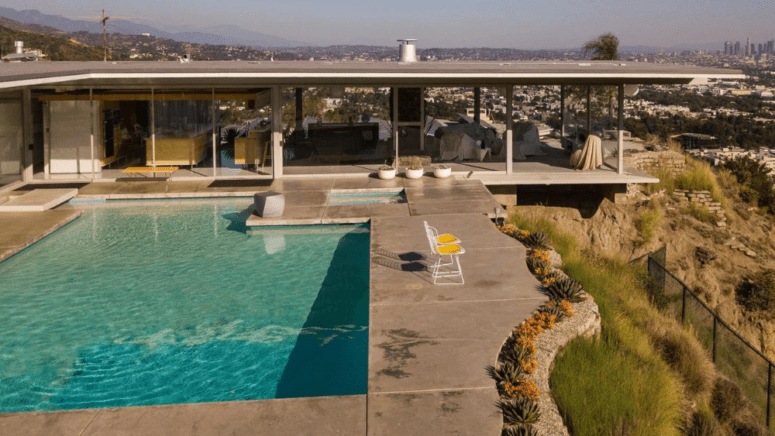Does a Pool Help or Hurt Your Home Value? Experts Take a Deep Dive
- Published on
- 10 min read
-
 Jennifer Schmidt, Contributing AuthorClose
Jennifer Schmidt, Contributing AuthorClose Jennifer Schmidt Contributing Author
Jennifer Schmidt Contributing AuthorJennifer Schmidt is a freelance writer based in Vancouver, Washington, who specializes in real estate, human resources, and technology. When not writing, you’ll find her scanning real estate listings for the latest housing trends and decorating ideas.
-
 Richard Haddad, Executive EditorClose
Richard Haddad, Executive EditorClose Richard Haddad Executive Editor
Richard Haddad Executive EditorRichard Haddad is the executive editor of HomeLight.com. He works with an experienced content team that oversees the company’s blog featuring in-depth articles about the home buying and selling process, homeownership news, home care and design tips, and related real estate trends. Previously, he served as an editor and content producer for World Company, Gannett, and Western News & Info, where he also served as news director and director of internet operations.
Shimmering pool water in your back yard would make any buyer fall in love with your home. Or would it? Even if you already have a swimming pool, do buyers want to happily splash or immediately dash from the responsibility of it? Figuring out the real value of a pool is important if you want your next home sale to go swimmingly.
Our research and experts can help you determine the true value of a pool. We’re including insights from top agent Donna Cox from Titusville, Florida, who has 44 years of experience and knows all about pool homes.
“It’s a feature, definitely,” Cox says, “but it will be an obstacle to some buyers because not everyone wants to take care of a pool.”
Getting the right answers for your particular situation will determine what actions you should consider before selling your home. If you’re ready to dive in and find out more, we have the answers for you here.
Does a pool add value to a home?
The value of a swimming pool is heavily determined by your local housing market, and whether potential buyers see it as an asset or liability. Many factors play a role in this perception, including the type of pool, safety considerations, and how it affects the backyard space, all things to consider if you are thinking of installing a pool before you sell.
Let’s compare the two major types of pools:
Above-ground pool
Above-ground pools are those that are installed above ground level, instead of being buried or semi-buried like most pools. This means that the external part of the pool basin structure is completely visible.
Most are quickly and easily installed, without the need for site preparation and excavation that in-ground pools require. The cost ranges from $1,008 to $6,000, according to Angi. Cox says most appraisers generally won’t include your above-ground pool in the appraisal unless it’s physically attached to your property.
In-ground pool
In-ground pools require site prep, excavation, and then installing a permanent concrete, fiberglass, or vinyl structure. There are many possibilities for your pool’s shape, the materials used for its liner or walls, the decking or paving materials around it, and added upgrades like waterfalls, slides, and diving boards.
An in-ground pool can be any size, but they typically range from 10 x 20 feet to 20 x 40 feet. Standard shapes include rectangle, square, round, kidney, L-shape, and oval. Each type of material will require different upkeep to ensure the pool stays well-maintained. According to HomeAdvisor, the cost to build most in-ground pools will range between $24,768 and $57,749.
“An appraiser will give a seller about $25,000 to $27,000 for a screened-in, in-ground pool. I have had sellers that spent $100,000 for a gorgeous pool and the appraiser would not increase the value on the appraisal for the pool. It made the seller very upset, but that’s just the way it is. You do not get a great return, and some people, buyers, won’t even look at a house that has a pool,” Cox says.
Why are pools so tricky when it comes to home value?
Pools have many positives and negatives when it comes to assessing their value when selling a home. While pools can serve as a personal oasis, not every buyer is going to want the liability or ongoing expense that comes with it. According to Cox, if the right buyer is looking for a home with a pool, they’ll love the fact that it’s already there versus having to install it.
Cox said that most buyers are young families who are interested in pool homes as opposed to retired couples who would rather use a community facility and not worry about maintaining their own pool.
Reasons to want a pool:
- Enjoyment for the entire family – gives you a chance to bond and play together
- Private outdoor entertainment – you can enjoy it any time without a crowd watching
- Convenient low-impact exercise – no traveling to the gym when you can swim instead
- Replaces need for a community pool – no relying on community amenities to have fun
Reasons to NOT want a pool:
- Continuous upkeep expenses: It may include monthly, annual, and occasional significant costs
- Insurance premiums increase: insurance for potential damage and overall liability
- Safety concerns for children: fear of potential drowning or injury to children
- Limits use of backyard space: If swimming isn’t your only hobby, you’ll want more space
In what situations do pools consistently boost home values?
Although a pool is generally considered a luxury, it can also boost your home value. In fact, in some housing markets, it’s actually seen as a deficit if you’re the only house without that refreshing retreat in your back yard. Some examples include:
High-end neighborhoods: If every other house has a pool as a standard amenity and you don’t, that expected feature could make your home less desirable when buyers are comparing what’s available in the market.
Hot and humid climates: In areas with hot climates where a pool can be used longer, such as California, Florida, Arizona, and Hawaii, buyers may be looking for relief from the blistering heat.
You have enough space: Home value can see a boost if you have the room not only to swim but also to use your back yard for other activities, such as a play area or a patio where you can enjoy outdoor living.
Pool is well-maintained: Everything about your pool says you care about keeping it safe, in good repair, and ready. This can also send a positive message about how you care for the rest of your property.
Helps showcase outdoor living: Your pool may complement the design of your house by being part of your outdoor entertainment center that might include a full kitchen, spa, or pool deck.
Demand is high: Buyers in your market may want — and are specifically looking for — a home with a pool that they can enjoy with their family and don’t have to wait until it gets assembled or installed.
“It’s definitely regional, and it would matter what kind of buyers you have. People in Florida and L.A. really want a pool. Pools are also popular in Palo Alto, where many estates have them,” according to Pam Zaragoza of Burlingame, California, who is a top real estate agent for luxury properties.
Did the pandemic change the value of adding a pool?
During the pandemic, people began to re-examine personal values and look for their own refuge. For many, pools have become a way to improve both physical and mental health while working from home.
Agents estimate that prior to COVID, a house with a pool fetched, on average, an estimated $16,137 more than a house without one. Now, a house with a pool could sell for an estimated $27,199 more on average.
However, with interest rates trending upward and financing becoming more expensive, dreams of installing a new pool could be delayed for some homeowners.

What else should I know if I am considering adding a pool?
In addition to the cost of monthly pool maintenance, larger expenses may be required for keeping your pool in good shape for the long term.
For instance, in Florida, Cox says a replacement pool pump is usually needed every two or three years. According to Angi, the average cost for buying and installing a replacement pump can range from $700 to $4,000.
Other costs related to a pool can include a pool heater, which Angi says can range from $1,790 to $4,148. And if you need to replace a pool liner, that typically costs between $1,218 to $3,803, on average.
Should I renovate or upgrade my pool before I sell?
Doing renovations or upgrades on your pool, according to Angi, will typically range from $5,330 to $14,762 depending on what you need to update. This can include resurfacing the pool if it’s an older one.
“Yeah, sometimes pools need to be resurfaced and that is considered in the purchase price or in the sale price of the home. It’s always nice if we can get the seller, if he has the available funds, to resurface the pool,” Cox says.
Should I remove my pool before I sell?
Removing or filling in a pool can cost between $5,000 to $8,000 depending on the type and size of your pool, according to Angi. You may consider this option if your pool is considered beyond repair, resembling a green swamp that even a frog wouldn’t inhabit. You can either choose a full or partial removal. A partial removal involves demolishing the pool in place and then adding dirt on top. If you opt for a partial removal, know that you’ll have to disclose this at the time of your sale.
What else should I do if I have a pool and I am preparing to sell?
A cloudy swimming pool won’t impress anyone and certainly won’t encourage people to come near, let alone swim. In addition, if your back yard is overgrown and in disarray, both areas will need to be addressed to get rid of that scary jungle environment. Cox recommends the best ways to spruce up your pool area is to make sure your pool is clean, well-maintained and the surrounding trees are trimmed and grass is cut.
“Usually if it’s a pool home, as a Realtor®, I will feature that as my first picture. I’ll get a really nice picture of the pool because buyers out there that want a pool will see the pool,” Cox says.
Do buyers consider a pool an added luxury or an added liability?
As an alternative to traveling, and spending time with family at home, many people see pools as a safe and fun way to create their own tropical resort. Others have concerns about a pool posing a threat to their children and the added cost of fencing and safety equipment needed to prevent any accidents.
Is it worth the cost to install a pool?
Cox says the return on a home seller’s investment won’t be worth what they paid for the pool if they’re only adding it to sell their home. This return is also going to be less than other home renovations.
Cox says you won’t get full value — more like 50% of its value. “Where if you do a kitchen or bathroom, you get a much higher rate of return,” Cox says.
Bottom line: Consider these 7 factors before a pool decision
- Accurately weigh your return on investment (ROI): Ask yourself how often you’ll use the pool once it’s installed, and consider all the maintenance costs.
- Skim, sweep, clean, and repair pool: If your pool and surrounding areas are not in good shape, buyers will see pool problems instead of a swimming retreat.
- If the pool is in disarray, haul it away: Think about removing the pool if it’s beyond repair to prevent it from becoming an unsightly swamp that deters potential buyers.
- How you’ll effectively market your pool: Use good, clear photos that showcase your pool as well as the surrounding landscaping.
- Know your market and buyers: Does your location and neighborhood support a pool lifestyle, and do the buyers who are available want a pool home?
- Timing is everything: If you live in a cooler environment, consider selling in the summer, which could encourage people to take the plunge. Also, if it’s a warmer environment, your pool could be an attractive asset.
- Partner with the right agent: An agent who knows about pool homes will be able to advise you on the best marketing strategies to find buyers.
If you’re ready to find a top agent who knows how to pool their resources and use their experience to help you, consider using HomeLight’s Agent Match platform. This free tool analyzes more than 27 million transactions and thousands of reviews to connect you with a performance-proven agent in your market.
Also, get a ballpark estimate on your home’s current value using HomeLight’s free Home Value Estimator. This automated valuation model tool uses information from multiple sources to create a real-time home value estimate based on current market trends.
Header Image Source: (Sterling Davis / Unsplash)
- "Above ground pools: design and features," Fluidra (May 2023)
- "In-Ground vs. Above-Ground Pools: Which Is the Best Investment?," Kiplinger, Donna Levalley (May 2024)
- "9 Inground Pool Shapes to Consider for Your Home," Angi, Rachel Hoffman (February 2024)
- "Does homeowners insurance cover your backyard pool?," Allstate, (June 2023)
- "How Much Space is Needed for a Pool?," Venture Custom Pools (January 2020)
- "Swimming Pool Statistics (2024)," Ruby Home, Tony Mariotti (January 2024)






